Tourism and Society: Impacts, Models, Stakeholder Analysis & PESTLE
VerifiedAdded on 2023/06/05
|8
|2806
|146
Essay
AI Summary
This essay provides a comprehensive analysis of the relationship between tourism and society. It begins by defining tourism and its various types (inbound, outbound, and domestic), highlighting its role in bringing diverse cultures together and generating wealth and jobs. The essay discusses both the positive and negative impacts of tourism on society, referencing statistical data and models like Leiper's Tourism System Model and push-and-pull factors. It examines stakeholder management, using tourist agents as an example, and elaborates on the cultural, social, and environmental impacts through a PESTLE analysis. Furthermore, the essay delves into tourist behaviors, expectations, and motivations, incorporating Maslow's theory and exploring cultural differences. It differentiates between intrinsic and extrinsic motivations, linking them to tourist typologies and travel decisions. The conclusion emphasizes tourism's significant role in the global economy, its potential for enhancing quality of life, and the importance of sustainable tourism practices to ensure future benefits while mitigating negative impacts.
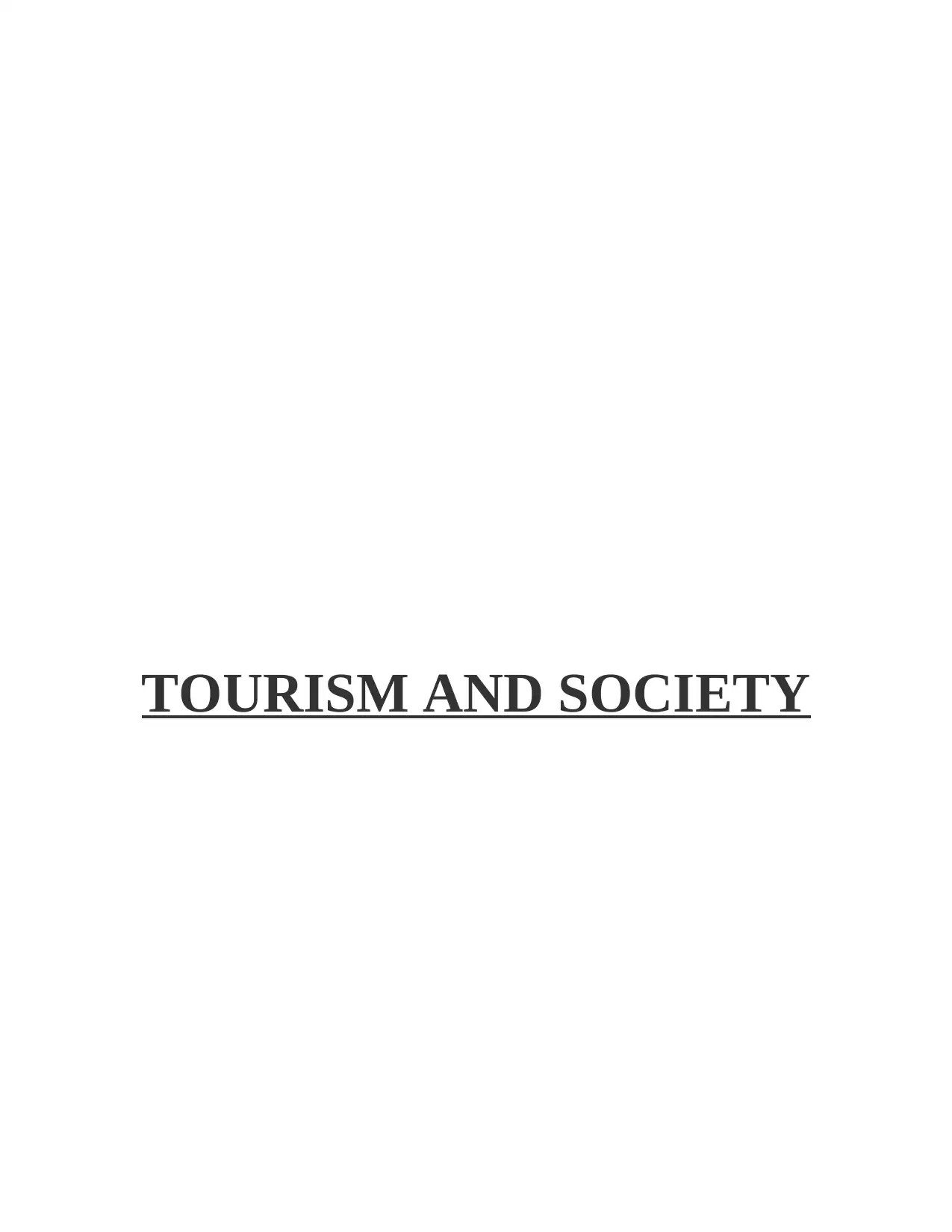
TOURISM AND SOCIETY
Paraphrase This Document
Need a fresh take? Get an instant paraphrase of this document with our AI Paraphraser
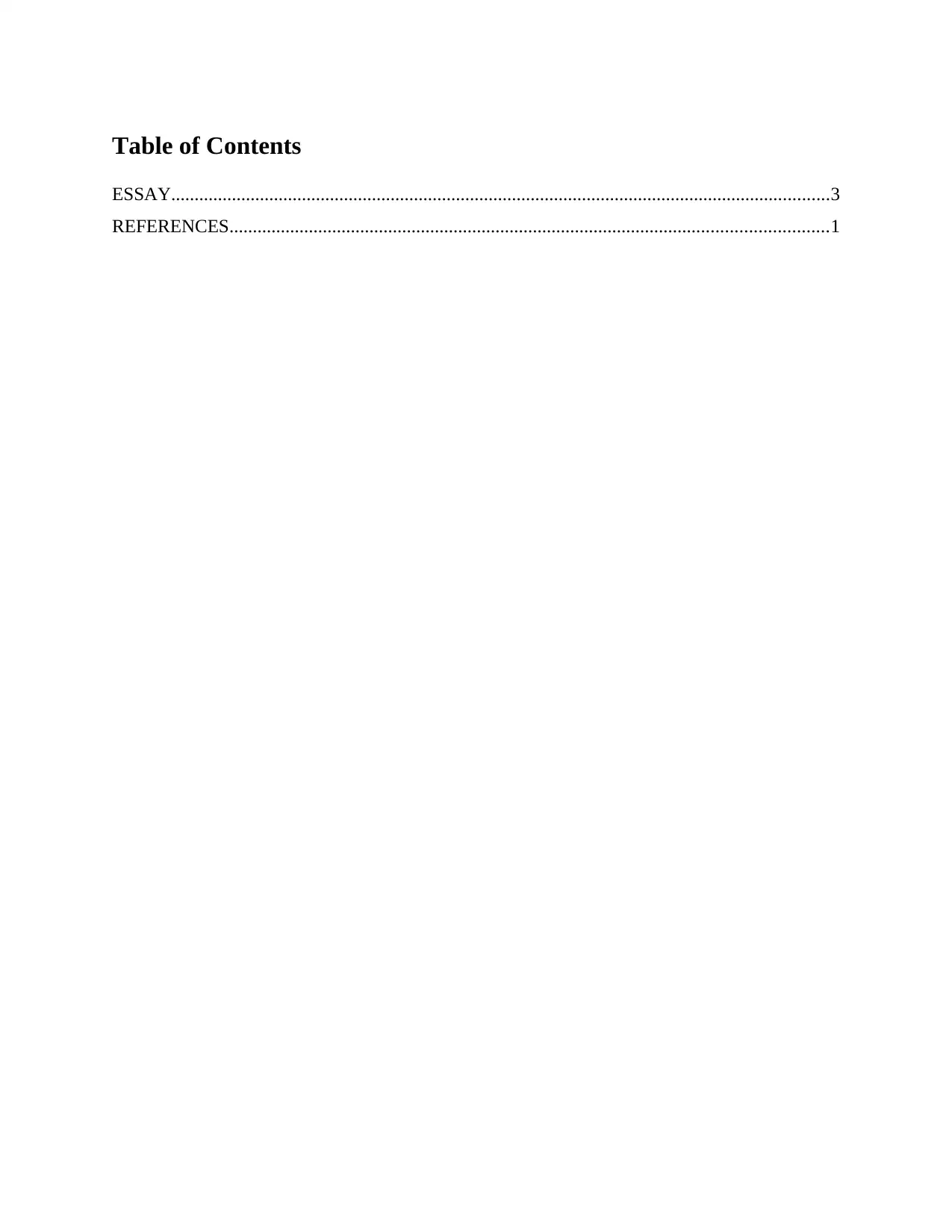
Table of Contents
ESSAY.............................................................................................................................................3
REFERENCES................................................................................................................................1
ESSAY.............................................................................................................................................3
REFERENCES................................................................................................................................1
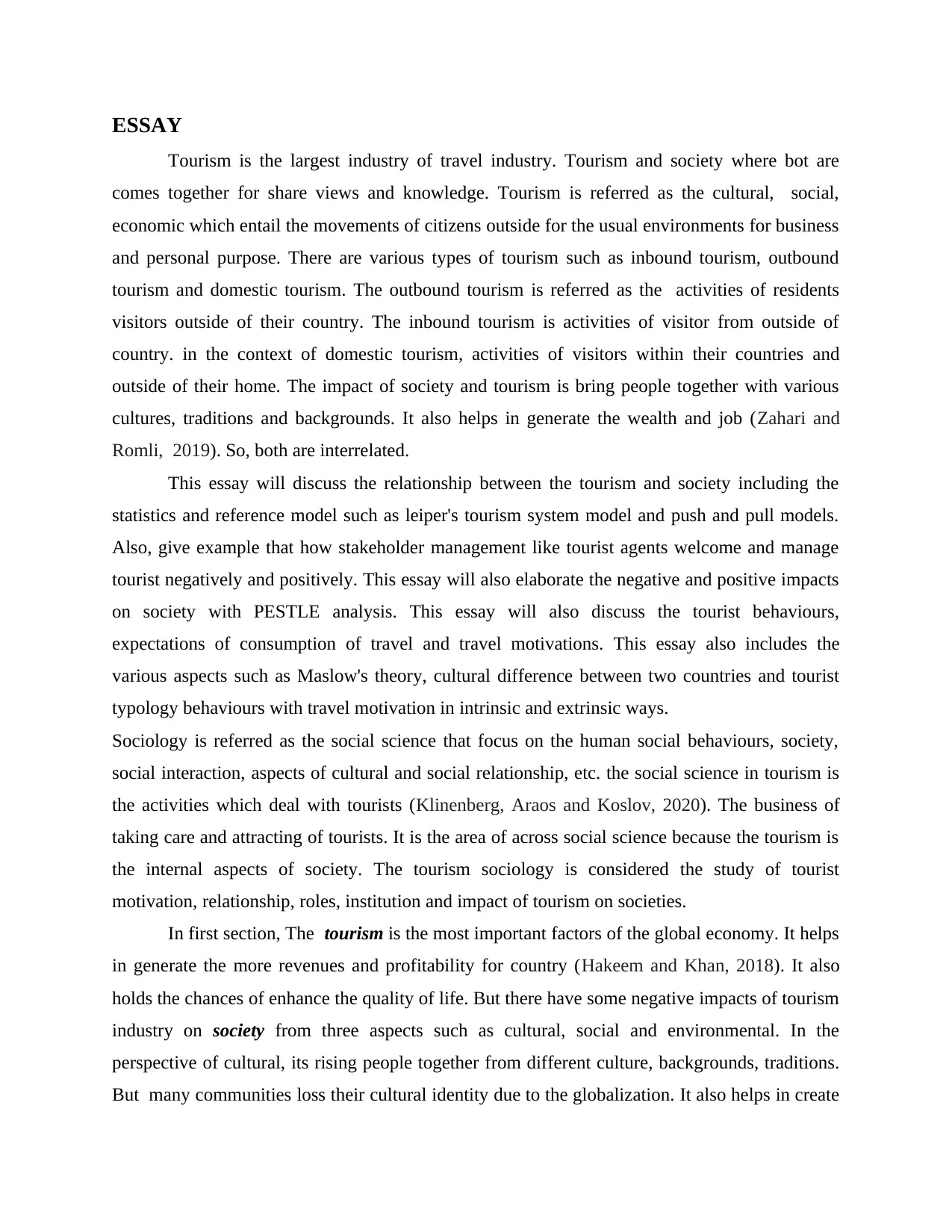
ESSAY
Tourism is the largest industry of travel industry. Tourism and society where bot are
comes together for share views and knowledge. Tourism is referred as the cultural, social,
economic which entail the movements of citizens outside for the usual environments for business
and personal purpose. There are various types of tourism such as inbound tourism, outbound
tourism and domestic tourism. The outbound tourism is referred as the activities of residents
visitors outside of their country. The inbound tourism is activities of visitor from outside of
country. in the context of domestic tourism, activities of visitors within their countries and
outside of their home. The impact of society and tourism is bring people together with various
cultures, traditions and backgrounds. It also helps in generate the wealth and job (Zahari and
Romli, 2019). So, both are interrelated.
This essay will discuss the relationship between the tourism and society including the
statistics and reference model such as leiper's tourism system model and push and pull models.
Also, give example that how stakeholder management like tourist agents welcome and manage
tourist negatively and positively. This essay will also elaborate the negative and positive impacts
on society with PESTLE analysis. This essay will also discuss the tourist behaviours,
expectations of consumption of travel and travel motivations. This essay also includes the
various aspects such as Maslow's theory, cultural difference between two countries and tourist
typology behaviours with travel motivation in intrinsic and extrinsic ways.
Sociology is referred as the social science that focus on the human social behaviours, society,
social interaction, aspects of cultural and social relationship, etc. the social science in tourism is
the activities which deal with tourists (Klinenberg, Araos and Koslov, 2020). The business of
taking care and attracting of tourists. It is the area of across social science because the tourism is
the internal aspects of society. The tourism sociology is considered the study of tourist
motivation, relationship, roles, institution and impact of tourism on societies.
In first section, The tourism is the most important factors of the global economy. It helps
in generate the more revenues and profitability for country (Hakeem and Khan, 2018). It also
holds the chances of enhance the quality of life. But there have some negative impacts of tourism
industry on society from three aspects such as cultural, social and environmental. In the
perspective of cultural, its rising people together from different culture, backgrounds, traditions.
But many communities loss their cultural identity due to the globalization. It also helps in create
Tourism is the largest industry of travel industry. Tourism and society where bot are
comes together for share views and knowledge. Tourism is referred as the cultural, social,
economic which entail the movements of citizens outside for the usual environments for business
and personal purpose. There are various types of tourism such as inbound tourism, outbound
tourism and domestic tourism. The outbound tourism is referred as the activities of residents
visitors outside of their country. The inbound tourism is activities of visitor from outside of
country. in the context of domestic tourism, activities of visitors within their countries and
outside of their home. The impact of society and tourism is bring people together with various
cultures, traditions and backgrounds. It also helps in generate the wealth and job (Zahari and
Romli, 2019). So, both are interrelated.
This essay will discuss the relationship between the tourism and society including the
statistics and reference model such as leiper's tourism system model and push and pull models.
Also, give example that how stakeholder management like tourist agents welcome and manage
tourist negatively and positively. This essay will also elaborate the negative and positive impacts
on society with PESTLE analysis. This essay will also discuss the tourist behaviours,
expectations of consumption of travel and travel motivations. This essay also includes the
various aspects such as Maslow's theory, cultural difference between two countries and tourist
typology behaviours with travel motivation in intrinsic and extrinsic ways.
Sociology is referred as the social science that focus on the human social behaviours, society,
social interaction, aspects of cultural and social relationship, etc. the social science in tourism is
the activities which deal with tourists (Klinenberg, Araos and Koslov, 2020). The business of
taking care and attracting of tourists. It is the area of across social science because the tourism is
the internal aspects of society. The tourism sociology is considered the study of tourist
motivation, relationship, roles, institution and impact of tourism on societies.
In first section, The tourism is the most important factors of the global economy. It helps
in generate the more revenues and profitability for country (Hakeem and Khan, 2018). It also
holds the chances of enhance the quality of life. But there have some negative impacts of tourism
industry on society from three aspects such as cultural, social and environmental. In the
perspective of cultural, its rising people together from different culture, backgrounds, traditions.
But many communities loss their cultural identity due to the globalization. It also helps in create
⊘ This is a preview!⊘
Do you want full access?
Subscribe today to unlock all pages.

Trusted by 1+ million students worldwide
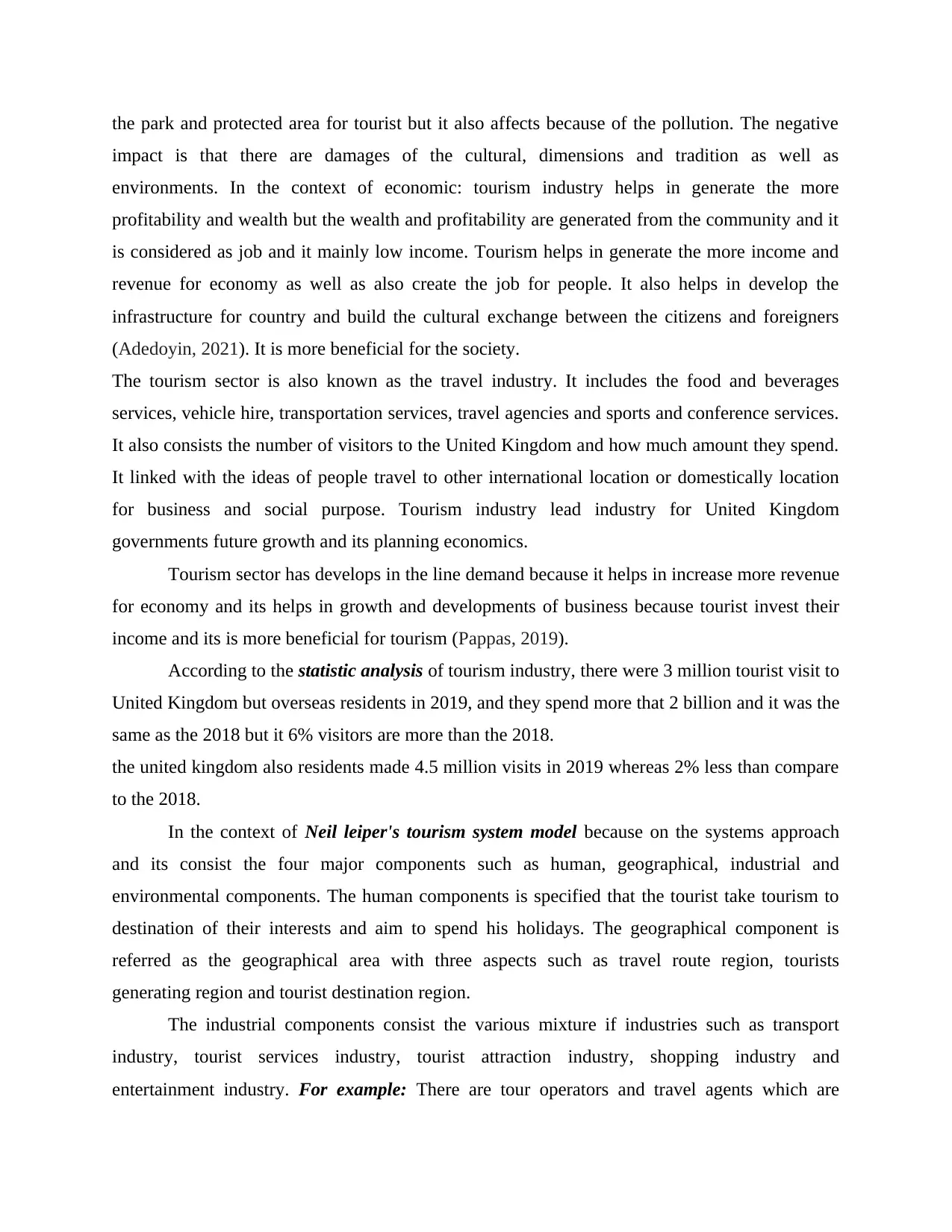
the park and protected area for tourist but it also affects because of the pollution. The negative
impact is that there are damages of the cultural, dimensions and tradition as well as
environments. In the context of economic: tourism industry helps in generate the more
profitability and wealth but the wealth and profitability are generated from the community and it
is considered as job and it mainly low income. Tourism helps in generate the more income and
revenue for economy as well as also create the job for people. It also helps in develop the
infrastructure for country and build the cultural exchange between the citizens and foreigners
(Adedoyin, 2021). It is more beneficial for the society.
The tourism sector is also known as the travel industry. It includes the food and beverages
services, vehicle hire, transportation services, travel agencies and sports and conference services.
It also consists the number of visitors to the United Kingdom and how much amount they spend.
It linked with the ideas of people travel to other international location or domestically location
for business and social purpose. Tourism industry lead industry for United Kingdom
governments future growth and its planning economics.
Tourism sector has develops in the line demand because it helps in increase more revenue
for economy and its helps in growth and developments of business because tourist invest their
income and its is more beneficial for tourism (Pappas, 2019).
According to the statistic analysis of tourism industry, there were 3 million tourist visit to
United Kingdom but overseas residents in 2019, and they spend more that 2 billion and it was the
same as the 2018 but it 6% visitors are more than the 2018.
the united kingdom also residents made 4.5 million visits in 2019 whereas 2% less than compare
to the 2018.
In the context of Neil leiper's tourism system model because on the systems approach
and its consist the four major components such as human, geographical, industrial and
environmental components. The human components is specified that the tourist take tourism to
destination of their interests and aim to spend his holidays. The geographical component is
referred as the geographical area with three aspects such as travel route region, tourists
generating region and tourist destination region.
The industrial components consist the various mixture if industries such as transport
industry, tourist services industry, tourist attraction industry, shopping industry and
entertainment industry. For example: There are tour operators and travel agents which are
impact is that there are damages of the cultural, dimensions and tradition as well as
environments. In the context of economic: tourism industry helps in generate the more
profitability and wealth but the wealth and profitability are generated from the community and it
is considered as job and it mainly low income. Tourism helps in generate the more income and
revenue for economy as well as also create the job for people. It also helps in develop the
infrastructure for country and build the cultural exchange between the citizens and foreigners
(Adedoyin, 2021). It is more beneficial for the society.
The tourism sector is also known as the travel industry. It includes the food and beverages
services, vehicle hire, transportation services, travel agencies and sports and conference services.
It also consists the number of visitors to the United Kingdom and how much amount they spend.
It linked with the ideas of people travel to other international location or domestically location
for business and social purpose. Tourism industry lead industry for United Kingdom
governments future growth and its planning economics.
Tourism sector has develops in the line demand because it helps in increase more revenue
for economy and its helps in growth and developments of business because tourist invest their
income and its is more beneficial for tourism (Pappas, 2019).
According to the statistic analysis of tourism industry, there were 3 million tourist visit to
United Kingdom but overseas residents in 2019, and they spend more that 2 billion and it was the
same as the 2018 but it 6% visitors are more than the 2018.
the united kingdom also residents made 4.5 million visits in 2019 whereas 2% less than compare
to the 2018.
In the context of Neil leiper's tourism system model because on the systems approach
and its consist the four major components such as human, geographical, industrial and
environmental components. The human components is specified that the tourist take tourism to
destination of their interests and aim to spend his holidays. The geographical component is
referred as the geographical area with three aspects such as travel route region, tourists
generating region and tourist destination region.
The industrial components consist the various mixture if industries such as transport
industry, tourist services industry, tourist attraction industry, shopping industry and
entertainment industry. For example: There are tour operators and travel agents which are
Paraphrase This Document
Need a fresh take? Get an instant paraphrase of this document with our AI Paraphraser
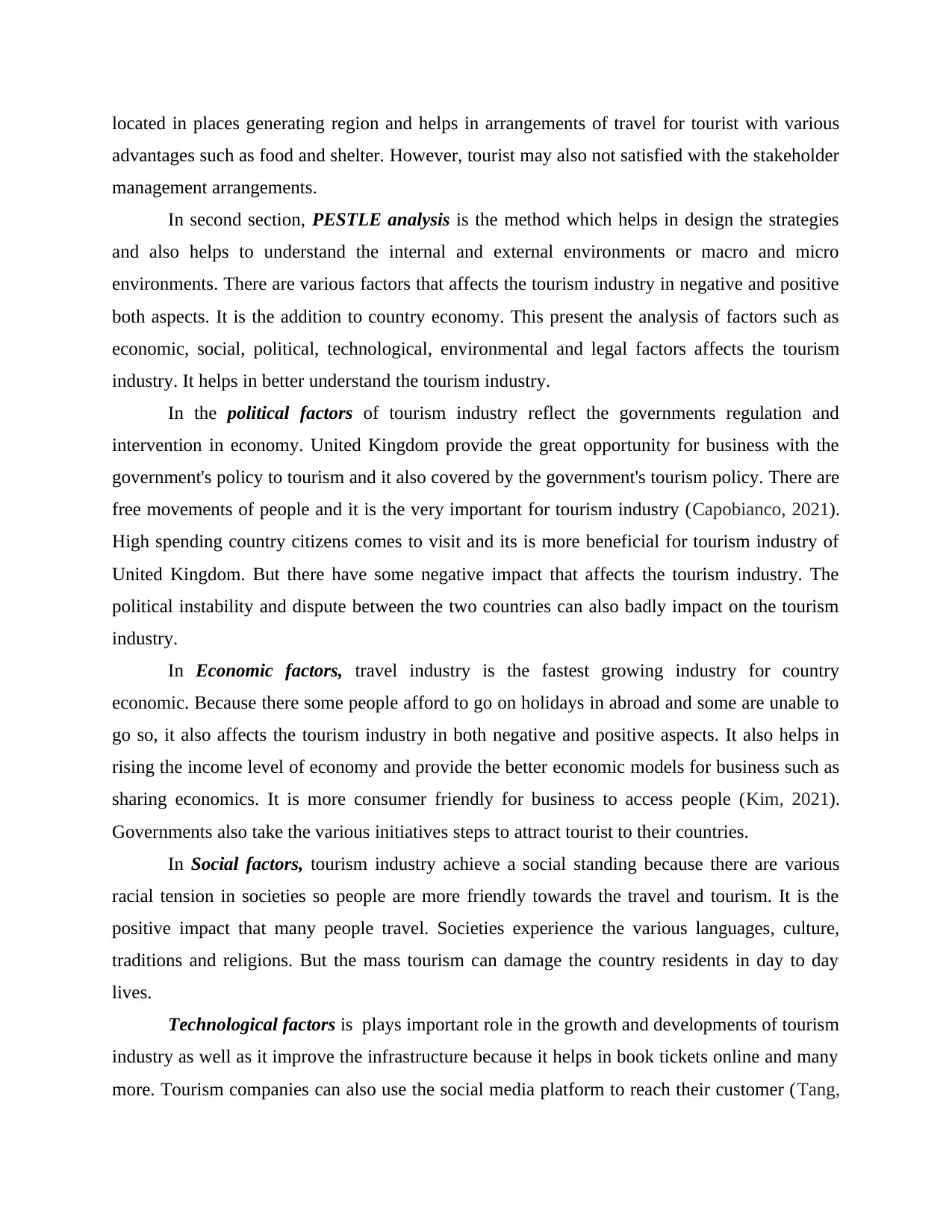
located in places generating region and helps in arrangements of travel for tourist with various
advantages such as food and shelter. However, tourist may also not satisfied with the stakeholder
management arrangements.
In second section, PESTLE analysis is the method which helps in design the strategies
and also helps to understand the internal and external environments or macro and micro
environments. There are various factors that affects the tourism industry in negative and positive
both aspects. It is the addition to country economy. This present the analysis of factors such as
economic, social, political, technological, environmental and legal factors affects the tourism
industry. It helps in better understand the tourism industry.
In the political factors of tourism industry reflect the governments regulation and
intervention in economy. United Kingdom provide the great opportunity for business with the
government's policy to tourism and it also covered by the government's tourism policy. There are
free movements of people and it is the very important for tourism industry (Capobianco, 2021).
High spending country citizens comes to visit and its is more beneficial for tourism industry of
United Kingdom. But there have some negative impact that affects the tourism industry. The
political instability and dispute between the two countries can also badly impact on the tourism
industry.
In Economic factors, travel industry is the fastest growing industry for country
economic. Because there some people afford to go on holidays in abroad and some are unable to
go so, it also affects the tourism industry in both negative and positive aspects. It also helps in
rising the income level of economy and provide the better economic models for business such as
sharing economics. It is more consumer friendly for business to access people (Kim, 2021).
Governments also take the various initiatives steps to attract tourist to their countries.
In Social factors, tourism industry achieve a social standing because there are various
racial tension in societies so people are more friendly towards the travel and tourism. It is the
positive impact that many people travel. Societies experience the various languages, culture,
traditions and religions. But the mass tourism can damage the country residents in day to day
lives.
Technological factors is plays important role in the growth and developments of tourism
industry as well as it improve the infrastructure because it helps in book tickets online and many
more. Tourism companies can also use the social media platform to reach their customer (Tang,
advantages such as food and shelter. However, tourist may also not satisfied with the stakeholder
management arrangements.
In second section, PESTLE analysis is the method which helps in design the strategies
and also helps to understand the internal and external environments or macro and micro
environments. There are various factors that affects the tourism industry in negative and positive
both aspects. It is the addition to country economy. This present the analysis of factors such as
economic, social, political, technological, environmental and legal factors affects the tourism
industry. It helps in better understand the tourism industry.
In the political factors of tourism industry reflect the governments regulation and
intervention in economy. United Kingdom provide the great opportunity for business with the
government's policy to tourism and it also covered by the government's tourism policy. There are
free movements of people and it is the very important for tourism industry (Capobianco, 2021).
High spending country citizens comes to visit and its is more beneficial for tourism industry of
United Kingdom. But there have some negative impact that affects the tourism industry. The
political instability and dispute between the two countries can also badly impact on the tourism
industry.
In Economic factors, travel industry is the fastest growing industry for country
economic. Because there some people afford to go on holidays in abroad and some are unable to
go so, it also affects the tourism industry in both negative and positive aspects. It also helps in
rising the income level of economy and provide the better economic models for business such as
sharing economics. It is more consumer friendly for business to access people (Kim, 2021).
Governments also take the various initiatives steps to attract tourist to their countries.
In Social factors, tourism industry achieve a social standing because there are various
racial tension in societies so people are more friendly towards the travel and tourism. It is the
positive impact that many people travel. Societies experience the various languages, culture,
traditions and religions. But the mass tourism can damage the country residents in day to day
lives.
Technological factors is plays important role in the growth and developments of tourism
industry as well as it improve the infrastructure because it helps in book tickets online and many
more. Tourism companies can also use the social media platform to reach their customer (Tang,
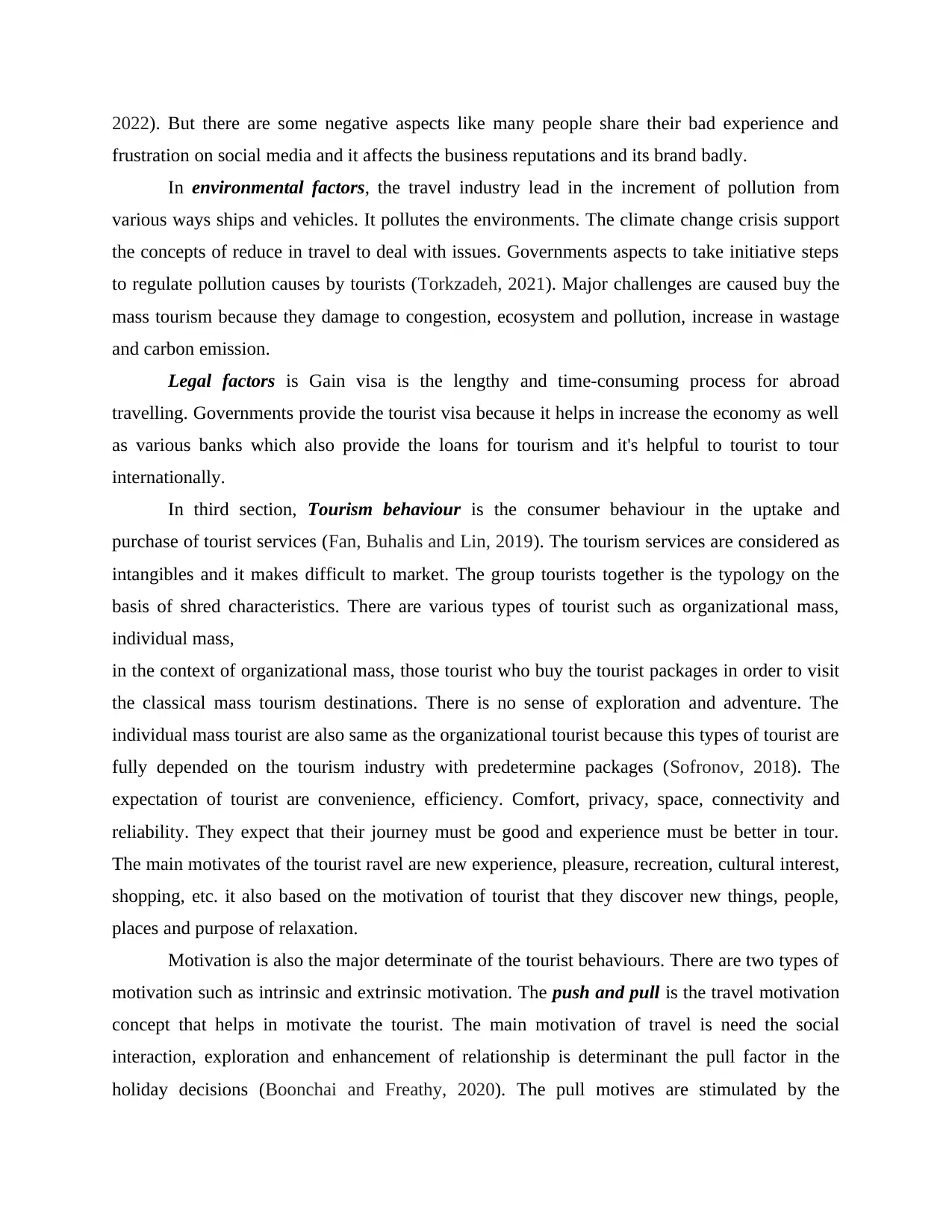
2022). But there are some negative aspects like many people share their bad experience and
frustration on social media and it affects the business reputations and its brand badly.
In environmental factors, the travel industry lead in the increment of pollution from
various ways ships and vehicles. It pollutes the environments. The climate change crisis support
the concepts of reduce in travel to deal with issues. Governments aspects to take initiative steps
to regulate pollution causes by tourists (Torkzadeh, 2021). Major challenges are caused buy the
mass tourism because they damage to congestion, ecosystem and pollution, increase in wastage
and carbon emission.
Legal factors is Gain visa is the lengthy and time-consuming process for abroad
travelling. Governments provide the tourist visa because it helps in increase the economy as well
as various banks which also provide the loans for tourism and it's helpful to tourist to tour
internationally.
In third section, Tourism behaviour is the consumer behaviour in the uptake and
purchase of tourist services (Fan, Buhalis and Lin, 2019). The tourism services are considered as
intangibles and it makes difficult to market. The group tourists together is the typology on the
basis of shred characteristics. There are various types of tourist such as organizational mass,
individual mass,
in the context of organizational mass, those tourist who buy the tourist packages in order to visit
the classical mass tourism destinations. There is no sense of exploration and adventure. The
individual mass tourist are also same as the organizational tourist because this types of tourist are
fully depended on the tourism industry with predetermine packages (Sofronov, 2018). The
expectation of tourist are convenience, efficiency. Comfort, privacy, space, connectivity and
reliability. They expect that their journey must be good and experience must be better in tour.
The main motivates of the tourist ravel are new experience, pleasure, recreation, cultural interest,
shopping, etc. it also based on the motivation of tourist that they discover new things, people,
places and purpose of relaxation.
Motivation is also the major determinate of the tourist behaviours. There are two types of
motivation such as intrinsic and extrinsic motivation. The push and pull is the travel motivation
concept that helps in motivate the tourist. The main motivation of travel is need the social
interaction, exploration and enhancement of relationship is determinant the pull factor in the
holiday decisions (Boonchai and Freathy, 2020). The pull motives are stimulated by the
frustration on social media and it affects the business reputations and its brand badly.
In environmental factors, the travel industry lead in the increment of pollution from
various ways ships and vehicles. It pollutes the environments. The climate change crisis support
the concepts of reduce in travel to deal with issues. Governments aspects to take initiative steps
to regulate pollution causes by tourists (Torkzadeh, 2021). Major challenges are caused buy the
mass tourism because they damage to congestion, ecosystem and pollution, increase in wastage
and carbon emission.
Legal factors is Gain visa is the lengthy and time-consuming process for abroad
travelling. Governments provide the tourist visa because it helps in increase the economy as well
as various banks which also provide the loans for tourism and it's helpful to tourist to tour
internationally.
In third section, Tourism behaviour is the consumer behaviour in the uptake and
purchase of tourist services (Fan, Buhalis and Lin, 2019). The tourism services are considered as
intangibles and it makes difficult to market. The group tourists together is the typology on the
basis of shred characteristics. There are various types of tourist such as organizational mass,
individual mass,
in the context of organizational mass, those tourist who buy the tourist packages in order to visit
the classical mass tourism destinations. There is no sense of exploration and adventure. The
individual mass tourist are also same as the organizational tourist because this types of tourist are
fully depended on the tourism industry with predetermine packages (Sofronov, 2018). The
expectation of tourist are convenience, efficiency. Comfort, privacy, space, connectivity and
reliability. They expect that their journey must be good and experience must be better in tour.
The main motivates of the tourist ravel are new experience, pleasure, recreation, cultural interest,
shopping, etc. it also based on the motivation of tourist that they discover new things, people,
places and purpose of relaxation.
Motivation is also the major determinate of the tourist behaviours. There are two types of
motivation such as intrinsic and extrinsic motivation. The push and pull is the travel motivation
concept that helps in motivate the tourist. The main motivation of travel is need the social
interaction, exploration and enhancement of relationship is determinant the pull factor in the
holiday decisions (Boonchai and Freathy, 2020). The pull motives are stimulated by the
⊘ This is a preview!⊘
Do you want full access?
Subscribe today to unlock all pages.

Trusted by 1+ million students worldwide
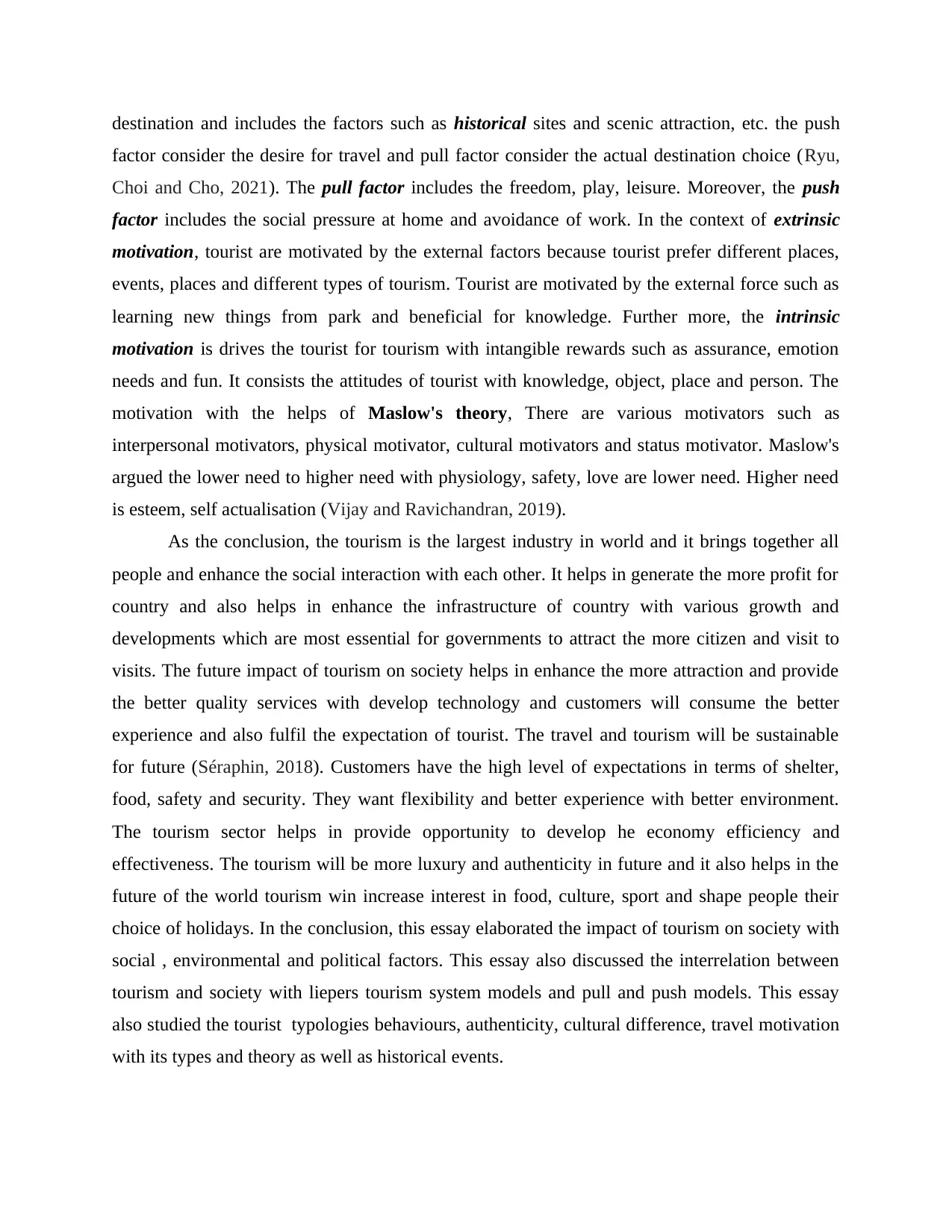
destination and includes the factors such as historical sites and scenic attraction, etc. the push
factor consider the desire for travel and pull factor consider the actual destination choice (Ryu,
Choi and Cho, 2021). The pull factor includes the freedom, play, leisure. Moreover, the push
factor includes the social pressure at home and avoidance of work. In the context of extrinsic
motivation, tourist are motivated by the external factors because tourist prefer different places,
events, places and different types of tourism. Tourist are motivated by the external force such as
learning new things from park and beneficial for knowledge. Further more, the intrinsic
motivation is drives the tourist for tourism with intangible rewards such as assurance, emotion
needs and fun. It consists the attitudes of tourist with knowledge, object, place and person. The
motivation with the helps of Maslow's theory, There are various motivators such as
interpersonal motivators, physical motivator, cultural motivators and status motivator. Maslow's
argued the lower need to higher need with physiology, safety, love are lower need. Higher need
is esteem, self actualisation (Vijay and Ravichandran, 2019).
As the conclusion, the tourism is the largest industry in world and it brings together all
people and enhance the social interaction with each other. It helps in generate the more profit for
country and also helps in enhance the infrastructure of country with various growth and
developments which are most essential for governments to attract the more citizen and visit to
visits. The future impact of tourism on society helps in enhance the more attraction and provide
the better quality services with develop technology and customers will consume the better
experience and also fulfil the expectation of tourist. The travel and tourism will be sustainable
for future (Séraphin, 2018). Customers have the high level of expectations in terms of shelter,
food, safety and security. They want flexibility and better experience with better environment.
The tourism sector helps in provide opportunity to develop he economy efficiency and
effectiveness. The tourism will be more luxury and authenticity in future and it also helps in the
future of the world tourism win increase interest in food, culture, sport and shape people their
choice of holidays. In the conclusion, this essay elaborated the impact of tourism on society with
social , environmental and political factors. This essay also discussed the interrelation between
tourism and society with liepers tourism system models and pull and push models. This essay
also studied the tourist typologies behaviours, authenticity, cultural difference, travel motivation
with its types and theory as well as historical events.
factor consider the desire for travel and pull factor consider the actual destination choice (Ryu,
Choi and Cho, 2021). The pull factor includes the freedom, play, leisure. Moreover, the push
factor includes the social pressure at home and avoidance of work. In the context of extrinsic
motivation, tourist are motivated by the external factors because tourist prefer different places,
events, places and different types of tourism. Tourist are motivated by the external force such as
learning new things from park and beneficial for knowledge. Further more, the intrinsic
motivation is drives the tourist for tourism with intangible rewards such as assurance, emotion
needs and fun. It consists the attitudes of tourist with knowledge, object, place and person. The
motivation with the helps of Maslow's theory, There are various motivators such as
interpersonal motivators, physical motivator, cultural motivators and status motivator. Maslow's
argued the lower need to higher need with physiology, safety, love are lower need. Higher need
is esteem, self actualisation (Vijay and Ravichandran, 2019).
As the conclusion, the tourism is the largest industry in world and it brings together all
people and enhance the social interaction with each other. It helps in generate the more profit for
country and also helps in enhance the infrastructure of country with various growth and
developments which are most essential for governments to attract the more citizen and visit to
visits. The future impact of tourism on society helps in enhance the more attraction and provide
the better quality services with develop technology and customers will consume the better
experience and also fulfil the expectation of tourist. The travel and tourism will be sustainable
for future (Séraphin, 2018). Customers have the high level of expectations in terms of shelter,
food, safety and security. They want flexibility and better experience with better environment.
The tourism sector helps in provide opportunity to develop he economy efficiency and
effectiveness. The tourism will be more luxury and authenticity in future and it also helps in the
future of the world tourism win increase interest in food, culture, sport and shape people their
choice of holidays. In the conclusion, this essay elaborated the impact of tourism on society with
social , environmental and political factors. This essay also discussed the interrelation between
tourism and society with liepers tourism system models and pull and push models. This essay
also studied the tourist typologies behaviours, authenticity, cultural difference, travel motivation
with its types and theory as well as historical events.
Paraphrase This Document
Need a fresh take? Get an instant paraphrase of this document with our AI Paraphraser
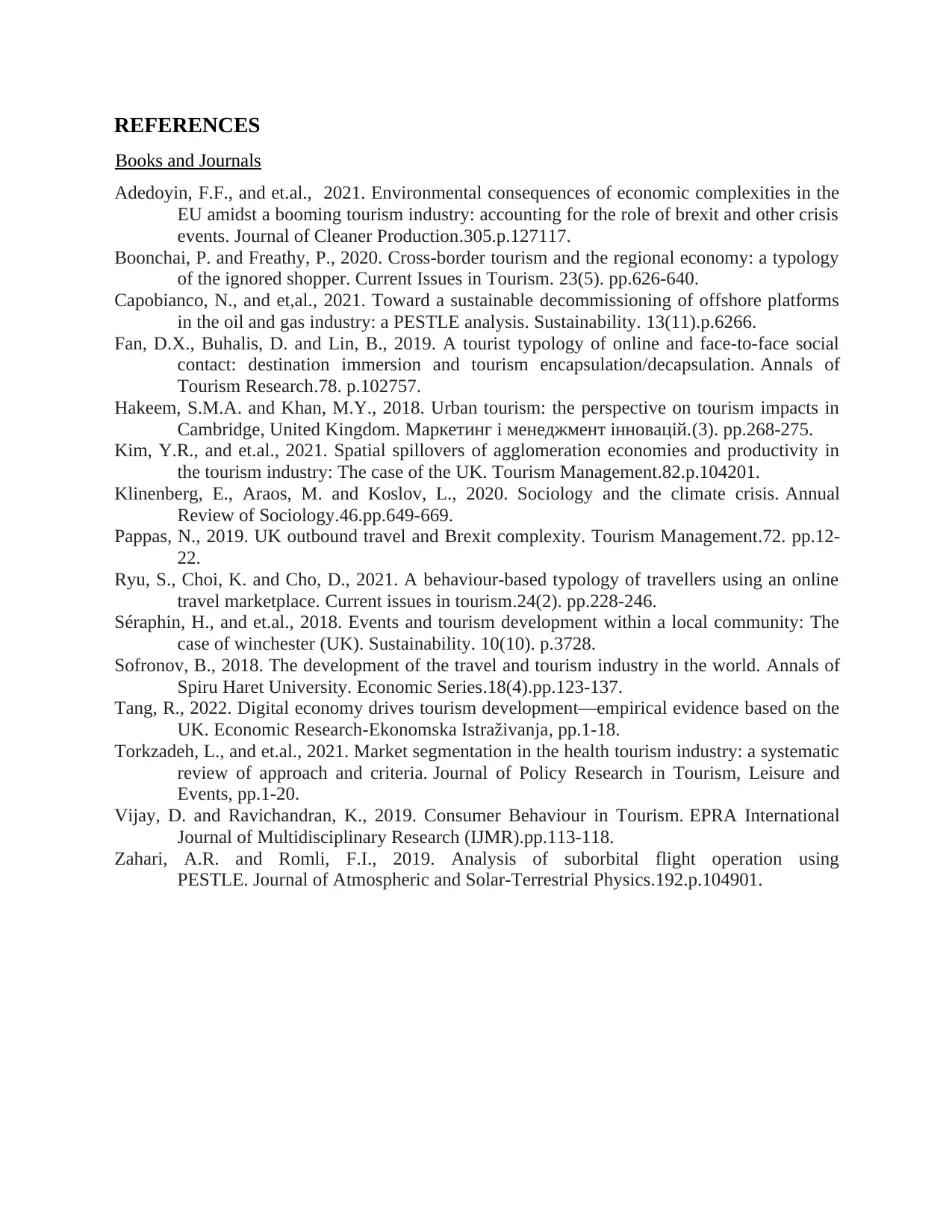
REFERENCES
Books and Journals
Adedoyin, F.F., and et.al., 2021. Environmental consequences of economic complexities in the
EU amidst a booming tourism industry: accounting for the role of brexit and other crisis
events. Journal of Cleaner Production.305.p.127117.
Boonchai, P. and Freathy, P., 2020. Cross-border tourism and the regional economy: a typology
of the ignored shopper. Current Issues in Tourism. 23(5). pp.626-640.
Capobianco, N., and et,al., 2021. Toward a sustainable decommissioning of offshore platforms
in the oil and gas industry: a PESTLE analysis. Sustainability. 13(11).p.6266.
Fan, D.X., Buhalis, D. and Lin, B., 2019. A tourist typology of online and face-to-face social
contact: destination immersion and tourism encapsulation/decapsulation. Annals of
Tourism Research.78. p.102757.
Hakeem, S.M.A. and Khan, M.Y., 2018. Urban tourism: the perspective on tourism impacts in
Cambridge, United Kingdom. Маркетинг і менеджмент інновацій.(3). pp.268-275.
Kim, Y.R., and et.al., 2021. Spatial spillovers of agglomeration economies and productivity in
the tourism industry: The case of the UK. Tourism Management.82.p.104201.
Klinenberg, E., Araos, M. and Koslov, L., 2020. Sociology and the climate crisis. Annual
Review of Sociology.46.pp.649-669.
Pappas, N., 2019. UK outbound travel and Brexit complexity. Tourism Management.72. pp.12-
22.
Ryu, S., Choi, K. and Cho, D., 2021. A behaviour-based typology of travellers using an online
travel marketplace. Current issues in tourism.24(2). pp.228-246.
Séraphin, H., and et.al., 2018. Events and tourism development within a local community: The
case of winchester (UK). Sustainability. 10(10). p.3728.
Sofronov, B., 2018. The development of the travel and tourism industry in the world. Annals of
Spiru Haret University. Economic Series.18(4).pp.123-137.
Tang, R., 2022. Digital economy drives tourism development—empirical evidence based on the
UK. Economic Research-Ekonomska Istraživanja, pp.1-18.
Torkzadeh, L., and et.al., 2021. Market segmentation in the health tourism industry: a systematic
review of approach and criteria. Journal of Policy Research in Tourism, Leisure and
Events, pp.1-20.
Vijay, D. and Ravichandran, K., 2019. Consumer Behaviour in Tourism. EPRA International
Journal of Multidisciplinary Research (IJMR).pp.113-118.
Zahari, A.R. and Romli, F.I., 2019. Analysis of suborbital flight operation using
PESTLE. Journal of Atmospheric and Solar-Terrestrial Physics.192.p.104901.
Books and Journals
Adedoyin, F.F., and et.al., 2021. Environmental consequences of economic complexities in the
EU amidst a booming tourism industry: accounting for the role of brexit and other crisis
events. Journal of Cleaner Production.305.p.127117.
Boonchai, P. and Freathy, P., 2020. Cross-border tourism and the regional economy: a typology
of the ignored shopper. Current Issues in Tourism. 23(5). pp.626-640.
Capobianco, N., and et,al., 2021. Toward a sustainable decommissioning of offshore platforms
in the oil and gas industry: a PESTLE analysis. Sustainability. 13(11).p.6266.
Fan, D.X., Buhalis, D. and Lin, B., 2019. A tourist typology of online and face-to-face social
contact: destination immersion and tourism encapsulation/decapsulation. Annals of
Tourism Research.78. p.102757.
Hakeem, S.M.A. and Khan, M.Y., 2018. Urban tourism: the perspective on tourism impacts in
Cambridge, United Kingdom. Маркетинг і менеджмент інновацій.(3). pp.268-275.
Kim, Y.R., and et.al., 2021. Spatial spillovers of agglomeration economies and productivity in
the tourism industry: The case of the UK. Tourism Management.82.p.104201.
Klinenberg, E., Araos, M. and Koslov, L., 2020. Sociology and the climate crisis. Annual
Review of Sociology.46.pp.649-669.
Pappas, N., 2019. UK outbound travel and Brexit complexity. Tourism Management.72. pp.12-
22.
Ryu, S., Choi, K. and Cho, D., 2021. A behaviour-based typology of travellers using an online
travel marketplace. Current issues in tourism.24(2). pp.228-246.
Séraphin, H., and et.al., 2018. Events and tourism development within a local community: The
case of winchester (UK). Sustainability. 10(10). p.3728.
Sofronov, B., 2018. The development of the travel and tourism industry in the world. Annals of
Spiru Haret University. Economic Series.18(4).pp.123-137.
Tang, R., 2022. Digital economy drives tourism development—empirical evidence based on the
UK. Economic Research-Ekonomska Istraživanja, pp.1-18.
Torkzadeh, L., and et.al., 2021. Market segmentation in the health tourism industry: a systematic
review of approach and criteria. Journal of Policy Research in Tourism, Leisure and
Events, pp.1-20.
Vijay, D. and Ravichandran, K., 2019. Consumer Behaviour in Tourism. EPRA International
Journal of Multidisciplinary Research (IJMR).pp.113-118.
Zahari, A.R. and Romli, F.I., 2019. Analysis of suborbital flight operation using
PESTLE. Journal of Atmospheric and Solar-Terrestrial Physics.192.p.104901.
1 out of 8
Related Documents
Your All-in-One AI-Powered Toolkit for Academic Success.
+13062052269
info@desklib.com
Available 24*7 on WhatsApp / Email
![[object Object]](/_next/static/media/star-bottom.7253800d.svg)
Unlock your academic potential
Copyright © 2020–2026 A2Z Services. All Rights Reserved. Developed and managed by ZUCOL.




